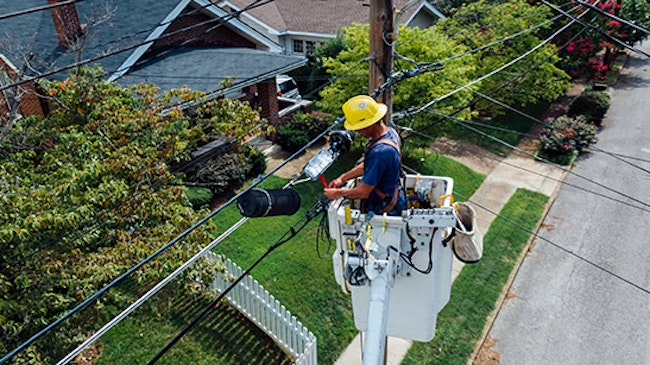Cell or Landline Monitoring: Which is Better?
When it comes to picking services for your home, differentiating between all of your options can get really overwhelming really fast. One of the choices that you might have to make is one between using cell or landline monitoring.
Traditionally, security has been funneled to homes via a connection to landline cables. This connection travels through the cables and into the home, offering benefits like alarm panel connection and security camera monitoring. Today, however, security monitoring can be provided for homes via cell towers.
A lot of security companies offer both cell phone and landline monitoring, and some security providers actually require their users to have both types installed in their homes. But if you don't know the difference between the two service types, how can you expect to make the best choice for your home?
We want to help make the decision between cell phone or landline monitoring easy for you, so this article discusses how each one works while unpacking the advantages and disadvantages of both systems.

Landline Monitoring
How Does Landline Monitoring Work?
Landline monitoring is a longstanding method of providing home security. Just as the name implies, this type of security monitoring uses landlines to alert emergency services when a home’s alarm is triggered. The installed security system is connected to the security company’s monitoring center through the phone lines. The hardwired pieces then connect to a phone line and provide security coverage for the whole house.
While it is easy to integrate, this older type of system can be easily circumvented by simply cutting the landline. Severing the connection interrupts security measures from being connected to your house.
Who Prefers Landline Monitoring?
This type of monitoring is useful for homes that have a landline connection already installed. It is a traditional security service, and it is also the most reliable type of monitoring because it doesn’t depend on good weather to provide a signal.
What are the Advantages of Landline Monitoring?
One of the biggest advantages of landline monitoring is that the signal is not easily disrupted by bad weather. It provides a stable connection that is less likely to go down in a storm. On the same line, it provides extremely reliable signal transmission to your security company’s monitoring center.
Most homes already have landline technology installed, so it is likely an easy type of security monitoring to use. Landline monitoring does not run on battery power, giving you one less thing to worry about since you won’t have to change any batteries.
Landline monitoring is also very affordable in both technology and monitoring cost. It is a time-tested, reliable, and responsive system.

What are the Disadvantages of Landline Monitoring?
Landline monitoring is going out of style. The number of people without landline phones in their homes is growing, and it is no longer standard for building companies to construct dwellings with landlines already installed. If you live in a house that is not equipped with a landline, you will have to install one to use landline monitoring in your home.
Landline monitoring usually has to be installed by a security company. Landlines are buried underground, and they are unorganized tangle of wires that provide landline coverage to a neighborhood. It would be nearly impossible to identify the landline that belongs to your house, so it is necessary to have someone else install landline monitoring for you.
When landlines do go down, the signal that connects your home and your security company can fail. Failing landlines can easily create false alarms, and false alarms create unnecessary panic and extra work for you and your security company.
Another downside of landline monitoring is that it is not compatible with home automation products. If you have newer technologies in your home, you might want to consider cell monitoring instead.

Cell Monitoring
How Does Cell Monitoring Work?
Cell monitoring, like landline monitoring, does exactly what its name implies. Where landline monitoring provides security through a house’s landline, cell monitoring provides security coverage through cell towers. This method of security monitoring has risen in popularity as cell phones have become standard in every home.
Who Prefers Cell Monitoring?
This type of monitoring is especially preferable for people who do not have a home phone or are looking for security monitoring and find that their home doesn’t have any landlines. It is also a newer system, meaning that it is compatible with home automation technology. This feature of cell monitoring makes it much more attractive to those who enjoy using smart security products in their homes.
What are the Advantages of Cell Monitoring?
A major draw of cell monitoring is that it can be placed anywhere and taken with you when you move. Since security is provided through cell towers rather than through a physical wire, you can take your cell monitoring with you from home to home.
Cell monitoring requires no wires, making it an easy system to install. Since there are no physical technologies in use, there is nothing for thieves to tamper with. This, combined with more advanced technologies, makes it a more reliable system than landline monitoring.
With cell monitoring, internet and cellular data are used to send signals to your security company’s monitoring center. This type of signal dispatches faster than a landline signal. Internet and cellular data technologies also make it possible for your home to be monitored remotely.
Another perk of cell monitoring is that you don’t have to pay anyone to come out and dig any holes to find wires underground. You can install it all yourself. For quality cellular monitoring try Cove.
What are the Disadvantages of Cell Monitoring?
While cell monitoring might be cheaper than paying to get a landline installed if your home doesn’t have one, it is more expensive upfront than landline monitoring is. It also depends on power. The standard source of power for cell monitoring is battery power, and cellular systems consume large amounts of battery energy. This means that cell monitoring requires more power, and you do have to monitor battery life to ensure adequate security coverage.
The signal sent from your home to your security system’s monitoring center is dependent on your network strength and stability with cell monitoring. A weaker signal means less reliable coverage and slower dispatch times.

Which Monitoring System is Best?
Landline monitoring is less likely to be disrupted by inclement weather, but cell monitoring is faster. Cell monitoring is wireless, but landline monitoring is less expensive. Since each system has its pluses and minuses and neither system is absolutely superior to the other, how can you know which one is best?
At the end of the day, both cell and landline monitoring have different things to offer. The better system will probably depend on your values and what you are looking for from your home security.
As we mentioned earlier, some security companies actually require you to have both systems installed. If you have a hard time choosing between the two, using both cell and landline monitoring lets you have the best of both worlds by giving you the perks of each system.
Ready to get started?
Take this short quiz to build your customized system today!
Takes less than a minute


